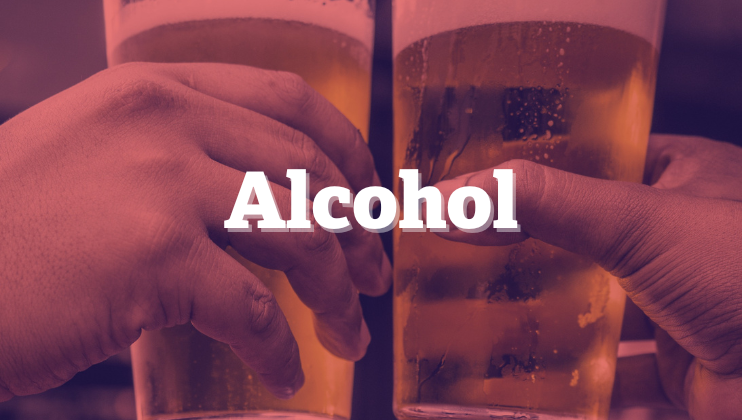How much alcohol does advice say we can have each week and is it different for men and women?
Regardless of what you might think is a lot or not, the guidance is the same for men and women. The Chief Medical Officer states that in order to reduce health risks connected to alcohol intake to limit consumption to a maximum 14 units per week, and to spread these units out over three or more days. To give you an idea of what this might look like, it will be around six pints of 4% beer, seven 175ml glasses of 11.5% wine or 14 single measure of a 40% spirit, such as gin.
I get confused with units, can you tell me how much a single unit is, in terms of a pint or glass of wine?
It can be confusing, because it varies, as it depends on the percentage of alcohol within any given drink, as well as the size of drink you have. Cans and bottles will say what volume of alcohol they contain either using the abbreviation of ‘vol’ or the letters ABV (alcohol by volume). If the bottles displays ‘13 ABV’ this means the drink within contains 13% pure alcohol. An average pint of beer has between two and three units of alcohol. A small glass of red wine (125ml, 12% ABV) contains 1.5 units whereas a medium glass (175ml) contains 2.1 units and a large glass (250ml) 3 units.

Why should we spread units out over the week, rather than drink it all in one go?
It takes the liver roughly one hour to process one unit of alcohol and remove it from your system. By spreading it out, you reduce the strain on your liver. Plus we may forget that alcohol can be in our system the following morning, so should not be getting behind a wheel. For example if you had five pints of beer one night, you should not be driving until at least ten hours later.
What’s your view on low-alcohol drinks? Are they more likely to push people to stronger drinks over time?
Low alcohol drinks can be useful to consume if out socialising as it can reduce harm and likelihood of binge drinking over six units. Some people like to use low or zero alcohol substitutes in order to fit into social situations, often to avoid being challenged for not drinking, (but we would encourage people not to give into this peer pressure, as it should be personal choice how much we consume.) In regards to using low alcohol drinks if there is a dependence to alcohol, this may be unlikely to help as the visual trigger will remind you of alcohol and is likely to trigger cravings to drink.
Why does alcohol affect me differently on different days?
Everyone responds to alcohol differently. Your height, weight and sex are just some of the factors that play a part in how alcohol affects you. Even what you’ve had to eat that day or how much sleep you’ve had can make a difference to how you feel when you drink.
Does alcohol affect your immune system?
Yes alcohol comprises your immune system and increases the risk of adverse health outcomes. Its also depletes your body of vital vitamins such as Thiamine, B1 AND b12, Folic acid and zinc.

I find myself needing to go to the bathroom really frequently at night, even after alcohol-free days. Is it related to my drinking?
Like tea and coffee, alcohol is a diuretic, which means it increases the production of urine, sending you to the loo more frequently. Alcohol also reduces the production of a hormone called vasopressin, which normally communicates with the kidneys telling them to reabsorb water rather than flush it out through the bladder. When this natural signal is turned off, the bladder is more likely to fill up with fluid meaning more visits to the loo in the night. It takes the body one hour to process one unit of alcohol, so if you often drink large quantities of alcohol you may still experience the need to visit the loo even after an alcohol-free day. If the issue continues it would be best to speak to your GP.
Why do we emotionally drink? For example, when I have a rubbish day I have a drink.
Alcohol is a depressant and although initially it can help to improve our mood and produce a euphoric feeling, it will ultimately depress us over time. Alcohol tends to exacerbate underlying emotions and lowers inhibitions so that the feelings come to the surface much quicker.
Does being an alcoholic mean someone who drinks every day, or is it more about the amount of units you have?
The term ‘alcoholic’ is used to describes someone who is alcohol dependent or who has been diagnosed with ‘Alcohol Use Disorder’, the characteristics of which are physical and psychological dependence on alcohol. The number of units usually exceeds the recommended weekly intake of 14 units by far. Drinkaware has produced a brilliant self assessment tool, which you can use to understand more about the impact of your drinking behaviour on your wellbeing.
Do you see alcohol dependency as a symptom of a struggle to cope with emotional issues?
Anyone can become physically dependent on alcohol if they drink large quantities regularly. Very often where people have a problematic relationship with alcohol there may be underlying emotional issues, alcohol initially started by providing short-term relief from their emotions. Over time people develop a tolerance to alcohol and consumption often creeps up, this can lead to negative emotions around their alcohol consumption.

I have been told not to stop completely as I currently drink around 20 units a day. What is the right amount to cut down to and over what period?
This is something you would need to seek specialist guidance from your local alcohol service for, as it is dependent on a number of factors such as any current medications, medical history and finding a regime that works for you. If you are concerned about withdrawals call NHS 111 service for medical advice. You can also find more about alcohol support on the NHS website and information on withdrawal at Drinkaware.
If you have drunk every day for a number of years, will any physical damage caused be irreparable?
The body is a powerful machine and can recover remarkably well from all sorts of traumas and injuries. The same is true for damage caused by long-term alcohol consumption. The danger is that many aspects of your health can be compromised and weakened by long-term heavy drinking. It is impossible to say exactly if any damage is irreparable as it will depend on the individual and the diagnosis. Something to be mindful of is that the hours your liver spends processing the alcohol in your body is time away from the hundreds of other functions your liver serves. Over time this may mean that your organs are not functioning at their optimum capabilities. Getting a general check up with your GP and requesting liver function tests may give you some clearer answers.
How would you suggest supporting someone with an alcohol dependency in the workplace, should you force them to remain off work until they seek help?
This is a tricky question as the role you play is likely to depend on your position at work. If you are in a position of leadership and you know someone you manage is dependent on alcohol it is likely to be a safeguarding issue and there may well be guidance in your employee handbook on how to proceed. Someone who is alcohol dependent needs support and compassion and so it may be best that they are given time off to address their dependency. Issues with alcohol or drugs and time away for treatment (depending on your work place) may be treated like any other sickness.
Being intoxicated at work is probably a violation of an employee’s contract so it is in their best interest to be off work whilst they seek support. Some employers may have insurance that covers rehab or counselling and so it may be worth looking into what level of support the employer is able to offer. If you are concerned for a colleague you think may be drinking at work you might express your concern to them directly, encouraging them to speak to their GP or manager at work. If you don’t feel comfortable doing this but are concerned how their drinking may impact on their ability to carry out their responsibilities then perhaps you’d be best sharing this concern with someone in senior management.
Does the charity have any presentations on alcohol awareness?
Yes! We’ve created a webinar that talks through some of the topics covered here as well as sharing some tips for ways to cut back. You can watch it below.




